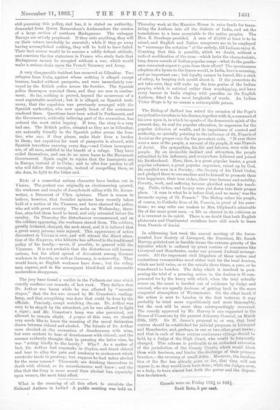The Bishop of Salford has seized the occasion of the
Pope's encyclical to circulate in his diocese, together with it, a comment of his own upon it, in which he speaks of the democratic spirit of the present day, its zeal for popular education, its eagerness for the popular diffusion of wealth, and its impatience of control and authority, as specially pointing to the influence of St. Francis of Assisi as the proper cure for the prevalent evils. "If ever there were a man of the people, a servant of the people, it was Francis of Assisi. His sympathies, his life and labours, were with the people. By an invincible instinct and attraction, the people submitted to his influence, and everywhere followed and joined his Brotherhood. Here, then, is a great popular leader, a great popular reformer, a great popular organiser, raised up by God. He enrolled men in a Society,--the Society of his Third. Order, and pledged them to one another and to himself to promote their true happiness, their true riches, their true honour and. nobility. Poverty, work, and suffering became glorified under his teach- ing. Pride, riches, and luxury were put down into their proper place. 'A man is what he is before God, and no more,' was the favourite saying of St. Francis." The Bishop refers his people, of course, to Catholic lives of St. Francis, in proof of his asser- tions; we may refer our readers to Mrs. Oliphant's admirable life of the same great man,—a life as shrewd in its criticism as it is reverent in its spirit. There is no doubt that both English plutocrats and Continental socialists have still much to learn from Francis of Assisi.






































 Previous page
Previous page